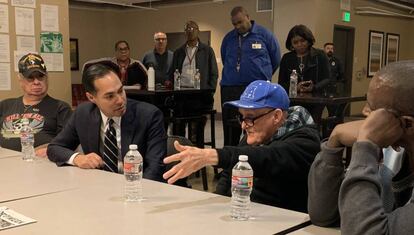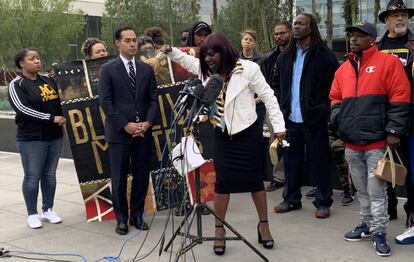Julián Castro: “At some point, the Democrats forgot to defend the poor”
The Democratic presidential candidate from Texas speaks to EL PAÍS about why he is focusing his campaign on vulnerable groups


Last Tuesday, a small group of people gathered in front of the central headquarters of the Los Angeles police to protest against police violence. They belonged to Black Lives Matter, a movement that calls for an end to the police brutality faced by young black people in the United States.
Standing with them in solidarity was Democratic presidential candidate Julián Castro, who listened respectfully to the family of Grechario Mack, a 30-year-old black man who was shot dead by police last year. When it was Castro’s turn to talk, he called for the officers who killed Mack to be fired, and said that he will set national standards on the use of force if he is elected president.
Donald Trump is not there to serve others. He's there to serve himself
“We have never had an interaction like that with a presidential candidate,” Melina Abdullah, the spokesperson for Black Lives Matters, told EL PAÍS. “They were the ones who called us and told us how they could help. This is the type of campaign that can be exciting to people like me.”
Indeed, protesting with victims of police violence is not a typical event for a presidential primary campaign. But it is typical of the kind of campaign that Julián Castro is running.
In the 24 hours he spent in Los Angeles last week, Castro did not pose for photos with any local or state leaders, nor with any famous campaign donors from Bel Air. Instead, he spoke to a political studies class at East Los Angeles University (ELAC), where students asked about healthcare, climate change, gun control and refugee policy. Afterwards, he went to the protest against police brutality. Castro ended the day with a panel discussion with war veterans who live in a center for homeless people that he launched in 2015, when he was the US housing secretary. In between, he met with a dozen supporters at a Mexican restaurant. In a short speech, he told them: “At some point in the last 40 years, the Democrats forgot to defend the poor.”

This moment occurred sometime during the Ronald Reagan administration, Castro explained later in an interview with EL PAÍS. “When Reagan talked about the ‘welfare queens’ and made it seem like if you're poor, there's something wrong with you. Some Democrats took that as ‘it's politically risky to talk about dealing with poverty.’ They tried to convince a generation of people that the war on poverty in the 1960s had failed, that it hadn't done any good, which is totally untrue.”
“I believe that as Democrats we can fight for the middle class,” he said. “But also for people sleeping on the streets, for people with disabilities who struggle every single day just to get through their lives, and for migrant children who have been separated from their parents. We've got to fight for everybody, because this president [Donald Trump] is only focused on people that looked like him and had a pocketbook like his.”
Julián Castro is a 45-year-old lawyer from Texas. His mother, María Castro, was an activist in the Chicano movement that began in the 1960s. He has an identical twin brother, Joaquín, who was born a minute after him. Influenced by their mother, both siblings entered politics: Julián was elected city councilor, and Joaquín as state congressman – he is now a member of the House of Representatives. In 2009, Julián was elected mayor of his native San Antonio. The rest of the country discovered him in 2012, when he gave a celebrated speech at a Democratic convention for the 2012 election. In 2014, then-president Barack Obama appointed him secretary of housing and urban development.
I tried to articulate a vision that includes everybody
From the White House, Castro watched as voters in the United States made Donald Trump the new president, leaving the world and the Democratic Party in shock.
“I believe that it was in part a reaction to Barack Obama, the first black president of the United States. It was also a reaction among some people who wanted to shake up the establishment. And they thought Donald Trump would do that. The problem with Donald Trump is that he's not there to serve others. He's there to serve himself. And it doesn't matter whether you're Republican or Democrat, in politics you want to find someone who is actually honest, and wants to serve you and your family, instead of serve himself or herself.”
Just over two years later, Castro was one of the first people to announce his nomination for the Democractic primaries. “I expected that we would have between 12 and 18 candidates,” he confessed. “At one point we had 25. And now we have 15. Either way, it's been a very crazy, very fractured race. But my message is finally resonating with voters, that I'm the candidate, more than any other, who has stood up for the most vulnerable people in our country. And I can feel that gaining momentum, especially in states like California.”
Castro made this statement just an hour after finding out that California senator Kamala Harris was pulling out of the Democratic presidential race. It was a surprise. Castro did not qualify to take part in the debate in November, and it’s not clear when he will have enough support to participate in the debate in December, which will take place in Los Angeles. His campaign is positive that they will be able to move forward because they are reaching voters who do not show up in the polls. The day that Castro missed the debate, for example, was their best fundraising day, and social media filled up with messages asking for him to be there.
But the primary race has entered a phase where nominations can implode from one day to the next, as was the case with Beto O’Rourke and Kamala Harris, and it is impossible to know whether Castro’s campaign has months or just hours left. “We still have nine weeks to go until the Iowa caucus. In politics that's like nine lifetimes,” explained Castro.
On Thursday, after Harris had made public her withdrawal from the race, Castro announced that he had raised $360,000 (€325,371) from 18,000 donors, with an average donation of $20 (€18). These figures mean that he meets one of the conditions to be in the debate, but he still needs a spike in the polls, which show an average support of 1.4%.
Most of the people who were upset that Castro did not take part in the debates highlight that he is the only Latino candidate. But while Castro is proud of his family’s history, he has never boasted about being the only Latino in the race.
I'm the candidate who has stood up the most for the most vulnerable people in our country
“There's no question that, in some ways, I stand out because of my background. People don't know quite what to do with that. I tried to articulate a vision that includes everybody, and to use my experience growing up the way that I did and as a leader, with my experiences, as mayor, as HUD secretary, that tell people what we need to do so that everybody can prosper whether they share my background or not.”
As a presidential candidate, Castro would have to win in places that don’t understand immigration and Latino culture as well as people do in the south of Texas or southern California.
“I think most people have a good heart and they want to understand,” he explained to EL PAÍS. “The best candidates out there and the best leaders are the ones who bridge that divide. And what I’ve been trying to do during the campaign is to bridge that divide, to do it in a respectful way, but also in a blunt way, in a fearless way. And I believe that we have a choice to make in America. Either we can go down the road of fear and division that Donald Trump wants us to go down. Or as we diversify as a country, we can gracefully accept that, and celebrate it, and get stronger because of it. That's what I want us to do. [...] I've tried to be a voice for lifting up people of different backgrounds.”
English version by Melissa Kitson.
Tu suscripción se está usando en otro dispositivo
¿Quieres añadir otro usuario a tu suscripción?
Si continúas leyendo en este dispositivo, no se podrá leer en el otro.
FlechaTu suscripción se está usando en otro dispositivo y solo puedes acceder a EL PAÍS desde un dispositivo a la vez.
Si quieres compartir tu cuenta, cambia tu suscripción a la modalidad Premium, así podrás añadir otro usuario. Cada uno accederá con su propia cuenta de email, lo que os permitirá personalizar vuestra experiencia en EL PAÍS.
¿Tienes una suscripción de empresa? Accede aquí para contratar más cuentas.
En el caso de no saber quién está usando tu cuenta, te recomendamos cambiar tu contraseña aquí.
Si decides continuar compartiendo tu cuenta, este mensaje se mostrará en tu dispositivo y en el de la otra persona que está usando tu cuenta de forma indefinida, afectando a tu experiencia de lectura. Puedes consultar aquí los términos y condiciones de la suscripción digital.








































